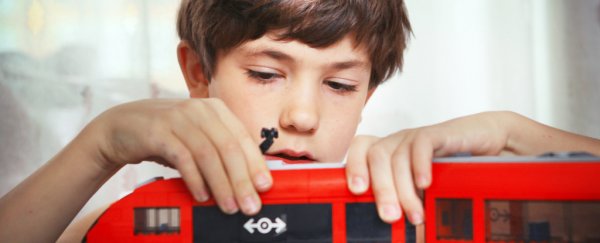A fresh look at data from earlier research has reaffirmed what many researchers had thought – autism is primarily in the genes.
Other studies have shown autism spectrum disorder ( ASD) tends to cluster in families and is associated with particular genes, but nailing down the risks with precision is a complex task. This new research has put a figure on the chances, claiming 83 percent of autism cases are inherited.
The study led by researchers from the Ichan School of Medicine in New York reanalysed a Swedish longitudinal study that involved over 2.6 million pairs of siblings, 37,570 pairs of twins, and just under a million half-sibling pairs.
Of these, 14,516 children had an ASD diagnosis.
Autism and its associated spectrum of conditions is a rather complex disorder, distinguished by difficulties in communicating and engaging in social interactions.
The signs usually aren't all that clear until a child might be expected to develop advanced communication skills, around age 2 to 3, making it hard to untangle genetic and environmental causes.
In fact, as recently as just half a century ago, physicians thought it could be the result of a lack of maternal love and affection.
Studies that have focussed on finding links between family relationships have come up with a variety of figures on the genetics of ASD.
Twin studies have suggested as many as 9 out of 10 children with autism inherited the condition through their combination of genes, though other studies have also put a more conservative estimate down towards 60 percent.
One study published in 2011 conducted by researchers from Stanford University in California put the chances of genetic heritability at around 38 percent for ASD.
An analysis conducted in 2014 also calculated a lower number, nearer to just 50 percent.
Which of these numbers are more accurate?
The researchers were skeptical of how the 50 percent figure was determined, suspecting that by taking into account the precise timing of the autism diagnosis, the estimate was being distorted.
So the researchers took the same massive data-set on Swedish children and used another method that had previously proven itself in the field, identifying a model that fitted best.
Their conclusion of 83 percent is closer to the 90 percent determined by earlier twin studies than the 38 percent of the California research, and was estimated with higher precision.
"Like earlier twin studies, shared environmental factors contributed minimally to the risk of ASD," write the researchers.
While we can be confident that genes play a key role in the development of the traits associated with ASD, we can also be sure that this won't be the final word on the matter.
For one thing, just one in 68 children is diagnosed with the disorder. While not extraordinarily rare, it's uncommon enough to make it hard to find a large enough sample size for precise predictions.
The condition isn't cut and dried, either, with the spectrum covering a range of behaviours and functions. It affects just 1 in 189 girls, while 1 in 42 boys are diagnosed.
Progress is being made in determining which genes are responsible for the neurological variations that give rise to autism-like functions, but it's slow going.
New research suggests a small fraction of the genes responsible might not be present in parents at all.
A recent study published in the American Journal of Human Genetics reported on the systematic analysis of genetic mutations among 2,300 families who had a single child affected by autism.
They found genetic changes that occur after conception – called postzygotic mosaic mutations – could be responsible for autism in around 2 percent of the individuals in their sample.
"This initial finding told us that, generally, these mosaic mutations are much more common than previously believed. We thought this might be the tip of a genetic iceberg waiting to be explored," says researcher Brian O'Roak from Oregon Health & Science University.
We're still a long way off mapping and understanding the role genes play in how our brains interact socially. And for all of this research, the environment can't be ruled out completely.
The more we discover, however, the clearer it is that ASD isn't a condition we can easily prevent by simply making the right choices as a parent.
This research was published in JAMA.
